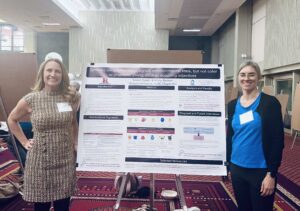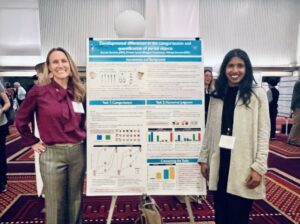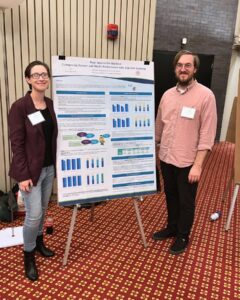Current faculty member Kristen Syrett and Rutgers alum Megan Gotowski presented posters at the Boston University Conference on Language Development (BUCLD) this November.

Kristen Syrett presented two poster presentations at BUCLD.
The first one, co-authored by Misha Becker was titled “Syntactic complementation signals emotion/mental state, but not color or shape, for young children acquiring adjectives”
Abstract: “We present two preferential-pointing word learning studies demonstrating that children age 3-6 take the presence of a syntactic complement (finite clause or prepositional phrase, documented by Syrett & Becker (2024) to frequently occur with emotion/mental state adjectives in child-directed speech) following a novel adjective to signal an abstract emotion/mental state, rather than a salient surface-level property such as shape or color. While children allow an adjective alone to map onto either property type, a syntactic complement systematically pulls their attention towards an emotion/mental state, thereby providing structural support for the acquisition of these adjectives, much as clausal complementation does for learning verbs such as think or know. Unlike previous adjective learning studies, ours pits a surface-level property against an abstract, internal one, thereby showing that syntax act as a “zoom lens” to focus word learners’ attention on mental aspects of the situation that are otherwise not salient and outwardly observable.”

The second one, co-authored by Karissa Sanchez and Athulya Aravind was titled “Developmental differences in the categorization and quantification of partial objects.”
Abstract: “Children systematically diverge from adults in treating ‘partial objects’ (e.g., a broken piece of a fork) as if they were wholes when prompted with a count noun. Prior accounts attribute this behavior to children’s still-developing numerical abilities or their still-developing nominal semantics/pragmatics. This research either addresses the quantification/numerical status of partial objects or their categorization/reference, without assessing the two simultaneously. Here, we ask how children and adults categorize partial objects, and how these same objects feed into assessments of cardinality. We find that children more often included partial objects as noun category-members, but even when they excluded them from the category, still counted them as |1|. We argue that children’s categorization reflects a minimal-standard semantics for count nouns, but they further deviate from adults in lacking fine-grained counting skills for measuring parts.”

Megan Gotowski, a Rutgers Linguistics PhD alum (currently a professor at William & Mary), also presented a poster at this conference. Megan’s poster, titled “Rage Against the Machine: Comparing Human and Model Performance with Adjective Learning” was co-authored by Forrest Davis (Colgate University).
Abstract: “During word learning, children recruit syntactic environments (frames) to map a form to a meaning. While adjectives are often found in individually un(der)informative frames, tracking them across environments is revealing for subcategorization. Nevertheless, the relative contribution of individual syntactic cues has yet to be determined—thus, it remains unclear which cues in the input learners are ”bootstrapping” during the learning process. Using a fill-in-the-blank paradigm, we assess the influence of frames associated with 5 subtypes of adjectives. We couple these experimental findings with an analysis of a language model trained on CHILDES to tease apart whether learners could be simply tuned to regularities in input or are sensitive to deeper properties of grammar. Overall, our results suggest humans recruit syntactic information in a way that goes beyond simple co-occurrence patterns learned by a language model, and that although frames may be compatible with multiple classes, not all are considered equally.”